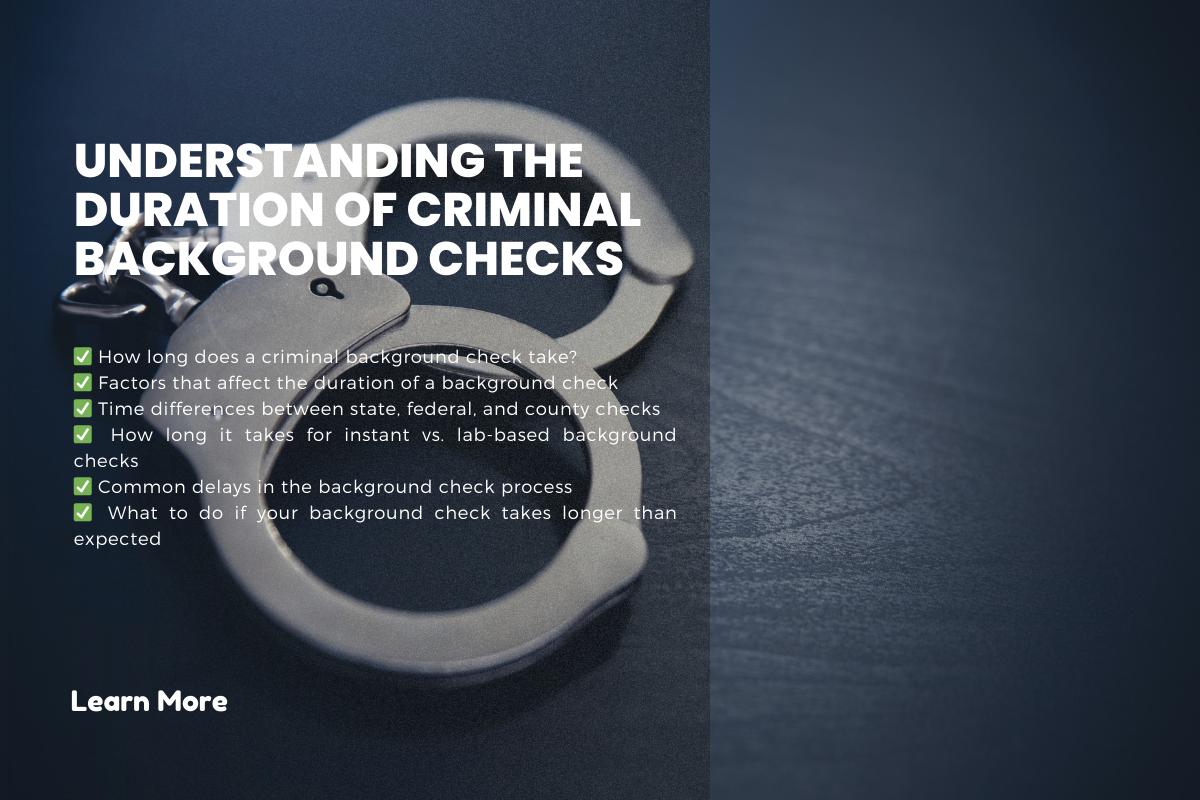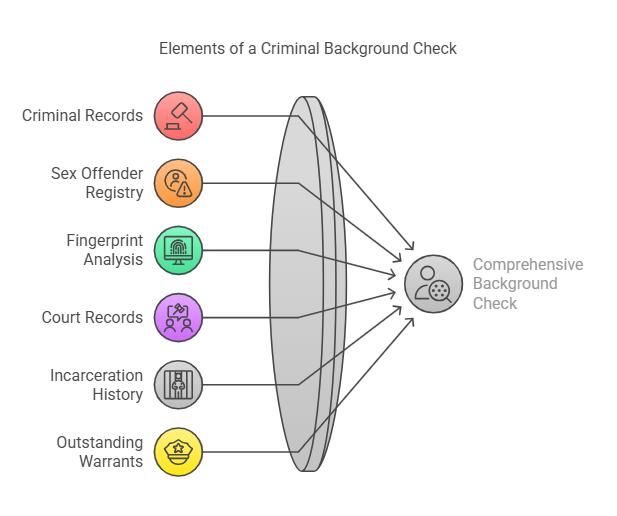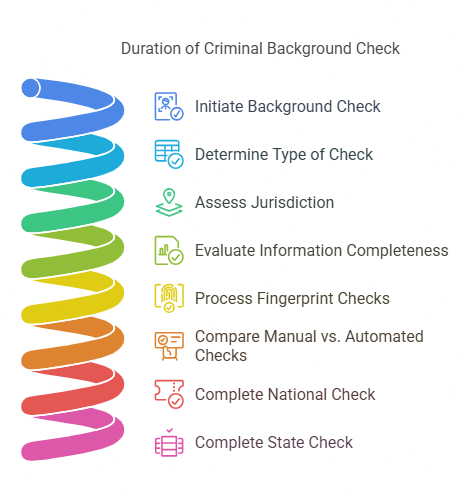Table of Contents
ToggleWhat is a Criminal Background Check and Why Does It Matter?

A criminal background check is an investigation conducted to assess an individual’s criminal history, primarily to ensure that someone has not been involved in illegal activities. These checks are common in various settings, including employment, housing applications, and legal matters, to verify the integrity and trustworthiness of a person.
What is Included in a Criminal Background Check?

A criminal background check includes several components depending on the purpose of the check and the jurisdiction involved. The main elements usually covered are:
- Criminal Records: This includes past convictions, pending charges, or arrest records.
- Sex Offender Registry: For certain checks, this will include a search against national or state sex offender registries.
- Fingerprint Analysis: Some checks, especially those for law enforcement or high-security jobs, require fingerprint-based checks.
- Court Records: This covers any criminal charges brought against the person, whether or not they resulted in a conviction.
- Incarceration History: In some checks, a record of previous incarcerations, whether felony or misdemeanor, is examined.
- Outstanding Warrants: A search may include active warrants that are issued for the person’s arrest.
Why Does a Criminal Background Check Matter?
Criminal background checks are important for several reasons, particularly for employers, landlords, and institutions involved in sensitive industries like healthcare and finance. Below are some of the key reasons why these checks are critical:
- Security and Safety: Background checks help employers, landlords, and other organizations ensure that individuals do not have a history of violent or criminal behavior that could pose a risk to others.
- Compliance with Laws: Certain industries and jobs require background checks by law. For instance, jobs in healthcare, finance, or education may require checks to comply with regulations.
- Trustworthiness: Employers and landlords want to verify that applicants or tenants are honest and have a history of good behavior. A clean record increases confidence in a person’s reliability.
- Preventing Liability: By conducting thorough background checks, employers reduce the risk of hiring someone who might later engage in criminal activity that could lead to legal or financial consequences.
Common Use Cases for Criminal Background Checks
- Employment: Many employers conduct criminal background checks as part of their hiring process. This ensures that employees meet the necessary safety and trust standards for their roles.
- Housing: Landlords often check the criminal history of potential tenants to prevent renting to individuals who may pose a safety risk or have a history of damaging property.
- Legal Matters: Background checks are commonly used in legal contexts, such as court hearings or probation assessments, to evaluate someone’s history and behavior.
Frequently Asked Questions About Criminal Background Checks
- What Information is Included in a Criminal Background Check? A criminal background check generally includes a person’s criminal records, arrest history, convictions, and pending charges. Some checks may also include information on sex offender registries or incarceration records.
- Why Do Employers Perform Background Checks? Employers use background checks to verify the truthfulness of a candidate’s application, assess whether a potential employee is a risk, and comply with legal requirements for certain positions. It helps ensure a safe working environment.
Understanding the importance of a criminal background check, and how it fits into various processes, is essential when considering its impact on your life or business. Whether for hiring, housing, or legal purposes, having a clean background is crucial. Now, let’s take a closer look at how long the criminal background check process can take, and the factors that influence its duration.
How Long Does a Criminal Background Check Take? Factors That Influence the Duration
The duration of a criminal background check can vary greatly depending on several factors, including the type of check, the jurisdiction, the provider, and whether additional information is needed to complete the check. On average, the process can take anywhere from a few minutes to several weeks. Understanding these factors can help you manage expectations and better navigate the background check process.
Key Factors That Affect the Duration of a Criminal Background Check

- Type of Criminal Background Check Different types of criminal background checks take different amounts of time to complete. Here are the main types:
- National Criminal Background Check: This check pulls data from nationwide databases and is typically the quickest, taking anywhere from a few minutes to 1-3 business days.
- State Criminal Background Check: Depending on the state, this type of check may take longer, often 3-7 business days, because the search is limited to a specific jurisdiction.
- Federal Criminal Background Check: A federal check is more in-depth and focuses on crimes under federal law. It can take 1-3 weeks or longer, especially if there is a need for additional documentation or clarification.
- County Criminal Background Check: This type of check requires accessing records at the local county level and may take 3-7 business days depending on the county’s processing times.
- FBI Background Check: An FBI background check, often involving fingerprint-based searches, may take 1-3 weeks, depending on the accuracy of the submitted data and the volume of requests being processed.
- Jurisdiction The jurisdiction in which the background check is being conducted plays a significant role in the processing time. Some states or counties have faster processing times, while others may have backlogs or slower response times due to staffing shortages or system inefficiencies. For example:
- Larger cities or states with automated systems may process checks faster.
- Rural areas or smaller jurisdictions may take longer as they may rely on manual systems or have fewer resources.
- Completeness of the Information Provided If the applicant’s personal information is incomplete or unclear, the background check can take longer to process. For example, if the subject’s full name, birthdate, or social security number is not properly entered, the provider may need to request additional details, causing delays in the process.
- Fingerprint-Based Checks When an employer or agency requires a fingerprint-based criminal background check (often for jobs in healthcare, government, or law enforcement), the process typically takes longer. Once the fingerprints are taken, they are submitted to the FBI or other relevant agencies for analysis. This can take anywhere from 1-3 weeks, depending on the accuracy and quality of the fingerprints.
- Manual vs. Automated Checks
- Automated Checks: Some background check providers use advanced technology and databases that provide instant or near-instant results. These are typically nationwide or state-level checks.
- Manual Checks: When the provider needs to go through paper records or manually request information from various agencies, it can significantly extend the timeline.
Average Processing Times for Different Types of Criminal Background Checks
| Type of Check | Estimated Processing Time |
|---|---|
| National Criminal Check | A few minutes to 1-3 business days |
| State Criminal Check | 3-7 business days |
| Federal Criminal Check | 1-3 weeks |
| County Criminal Check | 3-7 business days |
| FBI Background Check | 1-3 weeks |
How to Speed Up the Criminal Background Check Process
While some factors, such as jurisdiction and the type of check, are beyond your control, there are several ways to help expedite the process:
- Submit Accurate and Complete Information: Ensuring that all personal details (name, date of birth, social security number) are accurate will prevent delays.
- Use a Reliable Provider: Opting for a reputable provider that uses automated systems for background checks can significantly reduce processing times.
- Choose the Right Type of Check: If you are looking for a quick result, consider opting for a national check rather than a more detailed state, county, or federal check.
- Utilize a Service Like Rapid Hire Solutions: www.rapidhiresolutions.com provides an efficient background check service that helps streamline the process. Their comprehensive and automated background checks allow for faster results, reducing the overall wait time for applicants and employers alike.
- Plan Ahead: If the background check is needed for an urgent situation, such as a job start date or housing application, it’s advisable to start the process as soon as possible and factor in potential delays.
How Services Like Rapid Hire Solutions Can Help Expedite the Process
www.rapidhiresolutions.com is a trusted provider of criminal background check services that streamlines the entire process. By utilizing advanced technology and efficient processes, they help minimize delays and provide accurate results in a timely manner. With a focus on reliability, their services ensure that background checks are completed in a fraction of the time it might take using traditional methods.
Whether you are an employer who needs quick results for multiple candidates or an individual needing a fast background check, Rapid Hire Solutions provides an efficient and secure method for obtaining criminal background information, ensuring a smooth process for all parties involved.
As we explore the various elements that affect the duration of criminal background checks, it’s important to understand that the right provider can make a significant difference in both the speed and accuracy of the process. In the next section, we’ll address common questions and delays that may arise during background checks, and how you can navigate potential challenges.
Frequently Asked Questions, Common Delays, and Conclusion on Criminal Background Checks
Criminal background checks are a common requirement in various situations, including employment, housing, and legal matters. However, the process isn’t always straightforward, and individuals and businesses alike may encounter challenges. In this section, we’ll address common questions, explore potential delays, and offer advice on how to handle issues related to criminal background checks.
Frequently Asked Questions About Criminal Background Checks
How Long Does a Criminal Background Check Take?
The time it takes to complete a criminal background check can vary depending on the type of check being performed and the jurisdiction. On average:
- National checks take anywhere from a few minutes to 1-3 business days.
- State-specific checks can take 3-7 business days.
- Federal and county checks often take 1-3 weeks.
As mentioned earlier, factors such as missing information or whether fingerprint-based checks are required can add additional time.
Can I Speed Up the Background Check Process?
While you can’t control all the variables, there are steps you can take to expedite the process:
- Provide Complete and Accurate Information: The more accurate the information, the faster the verification process.
- Choose a Reliable Provider: Using a provider like www.rapidhiresolutions.com can help expedite the process. Their advanced tools and automated systems reduce delays and ensure a quicker turnaround.
- Opt for a National Check: If you don’t need a state-specific or county-level check, choosing a national check can often yield faster results.
What Can Delay a Criminal Background Check?
Several factors can cause delays in processing criminal background checks, including:
- Incomplete or Incorrect Information: If an applicant provides incorrect or incomplete details, it may cause delays as the provider must request clarification.
- Fingerprint Issues: For checks requiring fingerprints, any issues with the submission—such as poor-quality prints or errors during the submission process—can slow things down.
- Jurisdictional Delays: Some states or counties may take longer than others due to administrative backlogs, manual systems, or other inefficiencies.
- Additional Documentation or Verification: If more information is required, such as confirmation of past employment or legal documents, it can extend the timeline.
What Should I Do if My Criminal Background Check is Delayed?
If you encounter delays during your background check, it’s essential to:
- Contact the Provider: Reach out to the provider to get an update and identify the source of the delay. A reliable provider like www.rapidhiresolutions.com can quickly assist in resolving any issues.
- Ensure Accuracy: Double-check all information for accuracy to avoid delays related to incorrect data.
- Be Patient: Some delays are beyond anyone’s control, especially when it comes to jurisdiction-specific processing times or fingerprint verification.
How Long Does a Criminal Background Check Take?
The time it takes to complete a criminal background check can vary depending on the type of check being performed and the jurisdiction. On average:
- National checks take anywhere from a few minutes to 1-3 business days.
- State-specific checks can take 3-7 business days.
- Federal and county checks often take 1-3 weeks.
As mentioned earlier, factors such as missing information or whether fingerprint-based checks are required can add additional time.
Can I Speed Up the Background Check Process?
While you can’t control all the variables, there are steps you can take to expedite the process:
- Provide Complete and Accurate Information: The more accurate the information, the faster the verification process.
- Choose a Reliable Provider: Using a provider like www.rapidhiresolutions.com can help expedite the process. Their advanced tools and automated systems reduce delays and ensure a quicker turnaround.
- Opt for a National Check: If you don’t need a state-specific or county-level check, choosing a national check can often yield faster results.
What Can Delay a Criminal Background Check?
Several factors can cause delays in processing criminal background checks, including:
- Incomplete or Incorrect Information: If an applicant provides incorrect or incomplete details, it may cause delays as the provider must request clarification.
- Fingerprint Issues: For checks requiring fingerprints, any issues with the submission—such as poor-quality prints or errors during the submission process—can slow things down.
- Jurisdictional Delays: Some states or counties may take longer than others due to administrative backlogs, manual systems, or other inefficiencies.
- Additional Documentation or Verification: If more information is required, such as confirmation of past employment or legal documents, it can extend the timeline.
What Should I Do if My Criminal Background Check is Delayed?
If you encounter delays during your background check, it’s essential to:
- Contact the Provider: Reach out to the provider to get an update and identify the source of the delay. A reliable provider like www.rapidhiresolutions.com can quickly assist in resolving any issues.
- Ensure Accuracy: Double-check all information for accuracy to avoid delays related to incorrect data.
- Be Patient: Some delays are beyond anyone’s control, especially when it comes to jurisdiction-specific processing times or fingerprint verification.
Common Delays in Criminal Background Checks
- Missing or Incorrect Information: An incomplete name, misspelled details, or incorrect birthdates can cause confusion and delay results.
- Jurisdictional Backlogs: Some states and counties may be slower than others in processing requests, especially if they use manual systems.
- Fingerprint Issues: Low-quality fingerprints or mismatches during the FBI or other fingerprint-based checks can cause delays.
- Delays in Receiving Responses: Sometimes, the agencies responsible for processing criminal records are slow in responding to requests, which can add to the timeline.
How Professional Services Like Rapid Hire Solutions Can Help
www.rapidhiresolutions.com helps to address many of these challenges by offering a streamlined process for criminal background checks. Their team ensures that all the necessary steps are completed promptly, and they use automated systems to reduce the time it takes to gather results. By opting for services like these, individuals and employers can minimize delays, ensuring that the background check process is as fast and efficient as possible.
Conclusion: Ensuring a Smooth Criminal Background Check Process
Criminal background checks are a vital part of many decision-making processes, and understanding the factors that influence how long they take can help set expectations and avoid surprises. The duration of a background check depends on the type of check, the jurisdiction, the provider, and the quality of the information provided.
To ensure a smooth and timely process:
- Provide accurate and complete information.
- Choose a reliable and efficient background check service, such as www.rapidhiresolutions.com, to expedite the process.
- Be aware of the common delays that can affect the background check timeline and take steps to address them promptly.
By following these guidelines, you can navigate the criminal background check process with greater confidence and reduce the risk of delays that could impact your employment, housing, or legal matters.
By understanding the various factors that influence the duration of criminal background checks, you can make informed decisions and ensure that the process runs smoothly. Whether you are an employer, an applicant, or an individual in need of a background check, using a reliable service like www.rapidhiresolutions.com can significantly streamline the process and help you get results faster.
